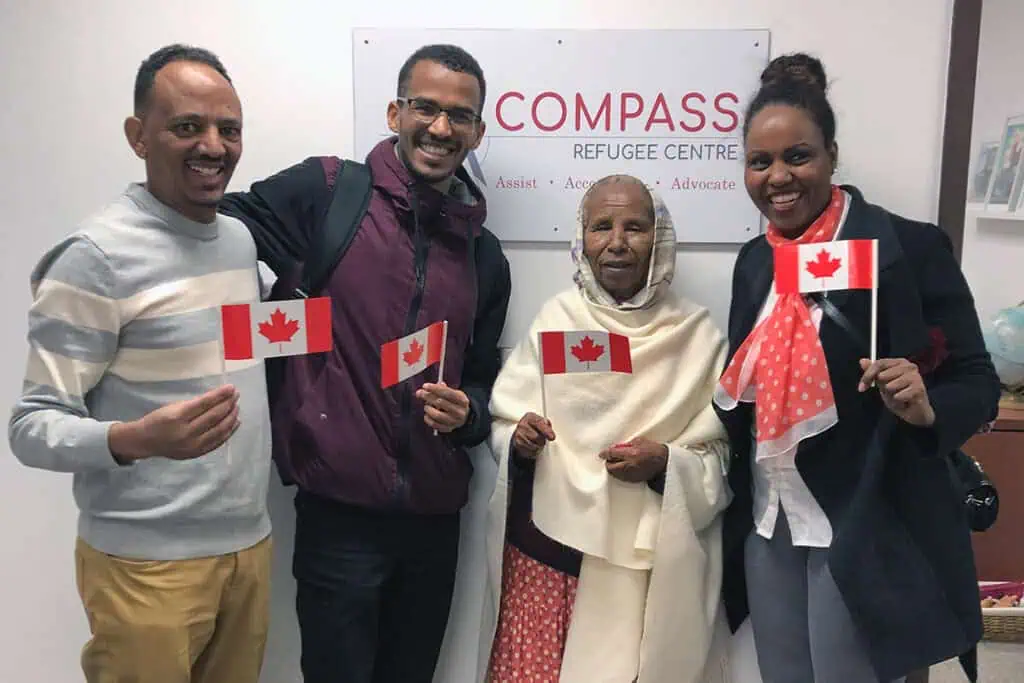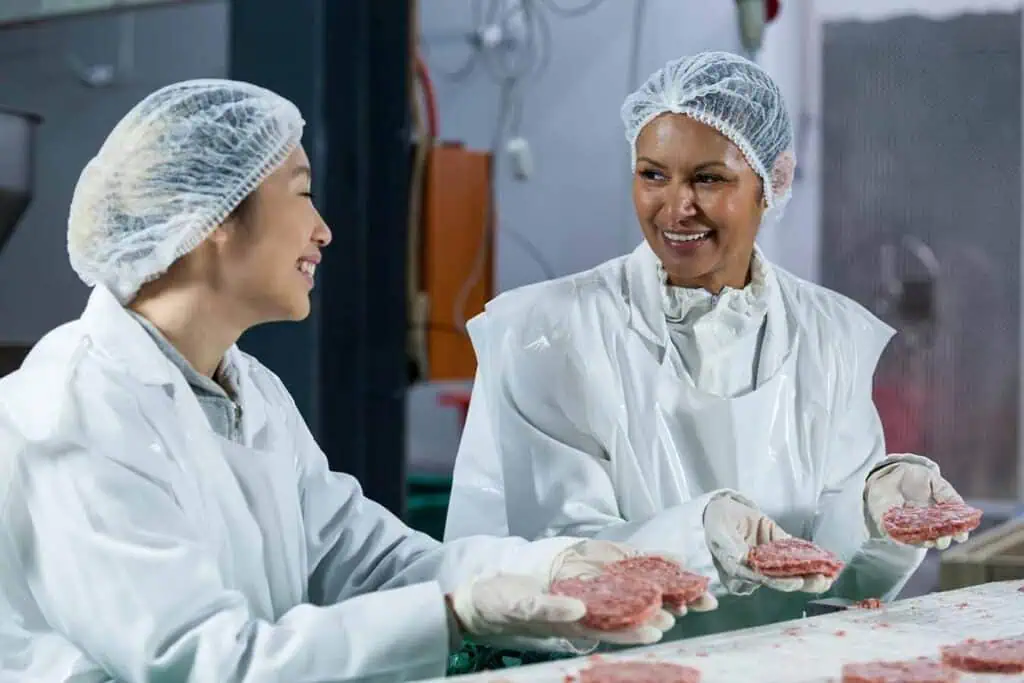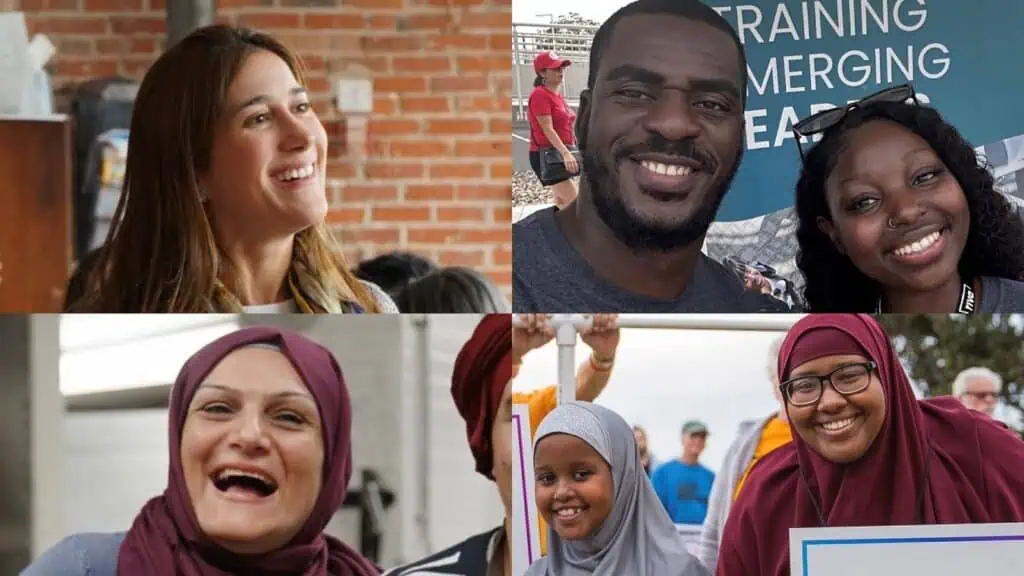How Six Community Organizations are Bridging Economic Gaps for Newcomers in the Peel Region of Ontario
Originally published on the Future of Good website, this post was written by Neha Chollangi.
The WES Mariam Assefa Fund is partnering with Future of Good on a series of digital stories to highlight the Fund’s first ever participatory grantmaking project. Developed in the Peel region of Ontario, the project is facilitated by the Tamarack Institute for Community Engagement.
Vipin Saini recalls that when his parents immigrated to Canada in the 70s, his dad’s previous experience working for the Indian Space Program was “worthless” in his new country.
“He used to fix and work on satellites from all over the world, but he ended up working in factories his whole life. There was a part of him that I knew was missing that challenge,” says Saini, executive director of Seva Food Bank. “But he was doing what he had to do to survive.”
Many newcomer organizations, even if they don’t specialize in employment services like career counselling or matching job seekers with employers, notice the ongoing barriers that immigrants and refugees face when it comes to finding work — especially work that suits their interests and experience.
When the WES Mariam Assefa Fund launched the participatory grantmaking pilot project last year, its aim was to support the economic mobility of immigrant and refugee populations. Through community nominations, the Fund selected the Peel Region in Ontario — where 51.5 percent of the population is made up of newcomers.
Facilitated by the Tamarack Institute, the participatory grantmaking process shifted the decision-making power from the funder to the community members. The Tamarack team engaged the Peel Region throughout this process and invited members of the community with relevant lived and professional experience to join what was called a “people’s panel.” The people’s panel members applied their lived experience and knowledge of the local landscape to build a funding opportunity that responded to the needs of Peel newcomers. When designing this funding opportunity, participants on the people’s panel made it clear that they were interested in projects that educated employers about the specific needs of marginalized immigrants and refugees, encouraged newcomer self-employment, provided holistic mental health support, and increased accessibility.
The second half of this pilot program involved guiding organizations in Peel through the application process, and then finally selecting the winners of the grant.
The six organizations granted funding from this participatory grant have built projects that take a new and intersectional approach to newcomer needs — for instance, by folding in mental health support within employment services. We profiled all six organizations to find out what projects they are working on with the grant funding, and what they hope to see flourish within the immigrant and refugee population of Peel.
SIKHS SERVING CANADA ASSOCIATION (SEVA FOOD BANK)
Seva Food Bank has developed a new culinary training program for immigrant women from low-income communities. The 10-week program provides mentorship and participants learn how to obtain their food handlers certificate, through the guidance of an Austrian-trained pastry chef.
Also, through a partnership with Family Services of Peel, the training program helps to match participants with relevant work in the food industry after they complete the program.
“There’s a huge demand for kitchen staff and cooking staff [in Peel],” says Saini. “So essentially what we’ve done is give them skills, and also give them a pathway to direct employment and not leave it to chance.”
Saini says they hope the program will give newcomer participants confidence to work in the food industry, and that it will serve as a launching pad for them to continue their professional journey.
AFGHAN WOMEN’S ORGANIZATION
While the Afghan Women’s Organization has employment services as a core part of what they offer immigrants and refugees, their team found that the program needed to be more holistic because many of their clients have multiple immediate needs, including mental health and wellness services, alongside employment support.
With the funding from WES, the organization is piloting a project to provide employment readiness training while also offering direct mental health services through counsellor support. They’re also bringing in peer leaders from the community who can connect with the program’s participants. This program will use a cohort model, where participants can connect with and support each other.
“Looking for work is difficult for anybody. Whether you’re new to a country or not, it’s a really difficult process,” says Nadya Weber, assistant to the executive director at the Afghan Women’s Organization. In this project, participants can “rely on each other, plus have a lot of tools that we’re getting from the mental health worker about how to keep positive about it, and how not to let it get them down.”

Photo courtesy of Afghan Women’s Organization
FAMILY SERVICES OF PEEL
Family Services of Peel, a multi-service organization for newcomers, is working on a project to conduct community-based research on newcomer needs in Peel. Sandra Rupnarain, executive director, says the project idea came out of an issue her team identified: that the organization’s approaches tended to be top-down rather than starting with asking immigrants and refugees what they need.
Family Services of Peel has partnered with the University of Toronto for this research project that will first assess the existing research about newcomer needs in Peel, and then conduct community consultations with immigrants and refugees in Peel on their individual needs.
Through additional partnerships with other community-serving organizations in Peel, Rupnarain explains that Family Services of Peel will also set up focus groups of community members and conduct interviews. The organization is hoping to document the services newcomers say they need, and then use that data to develop supports that are more responsive, targeted, and useful.
LAADLIYAN
Laadliyan, an organization dedicated to educating South Asian women and nonbinary people about topics like gender-based violence and menstrual hygiene, is using the funding from WES to develop training materials on best practices for hiring and employing international students. International students are commonly underpaid, overworked, and taken advantage of.
“This exploitation of international students has just gone too far now and employers need to understand that they’re going to be held accountable,” says Manvir Bhangu, founder of Laadliyan. “We want to train [employers] on how to hire and support international students that identify as women in a much more holistic way and not just kind of use [these students] as two hands to help them do their work.”
The organization is working on creating training modules for local small and midsize employers to create safer, more inclusive workplaces which include education about topics like housing issues, transportation, and sexual abuse that international students face. The project also has a participatory dimension as it involves doing consultations with international students and documenting the barriers to employment they’ve faced. They’ll also facilitate support networks for these international students to support their well-being and sense of belonging.
MIAG CENTRE FOR DIVERSE WOMEN AND FAMILIES
The MIAG Centre for Diverse Women and Families is a multi-service organization that works to identify service gaps for local community needs. Through the funding they were granted by WES, they’ve started a self-employment training program for immigrant and refugee women. Participants in this program will be provided with resources and tools to create their own business and learn how to be self-employed.
The project is a collaborative and innovative program that will connect participants with individual coaches who’ll help them develop their business ideas and prepare for self-employment. The project will also create a website — similar to Etsy — where the participants can sell their products through portals. The trainees will learn how to write descriptions of the business and products, how to take good photos of the products, and how to connect with customers.
Huda Abbas, executive director of the organization, explains that the project has two layers: The first is to prepare these women to be self-employed entrepreneurs in the job market. The second layer aims to equip them with tools to market their own products.
Through this program, Abbas says she’d love to see immigrant and refugee women set ambitious goals for themselves, and “reach a higher level of employment in their futures.”
PEEL DISTRICT SCHOOL BOARD
The Peel District School Board (PDSB) attracts thousands of newcomers seeking to learn English every year — many of whom also seek additional settlement services through the board, like career coaching.
With the grant, PDSB has hired a new career coach (also known as the pathways coach worker) who is there to specifically connect marginalized immigrants and refugees who are enrolled in adult education programs with pathways and programs in Peel (that is, bridging programs) that can guide them to the career they want to pursue.
“Many of our learners not only want to learn English, but when they settle in a new country, it’s about paying the bills as well and finding employment opportunities,” says Cindy Ryan, manager of non-credit programs & strategy development at the PDSB.
PDSB envisions this project helping newcomer students feel more confident about the skills and knowledge they already possess and know how to use them in the Canadian workforce. This might mean, for example, helping a student with a law degree from another country obtain credential evaluation services, access a bridging program, or find an entry-level position in the field.
“The legacy I’d like to leave is that newcomers feel more confident about accessing the resources from settlement services, community agencies, [and] employers — and taking advantage of the full scope of services that are out there,” says Ryan.




